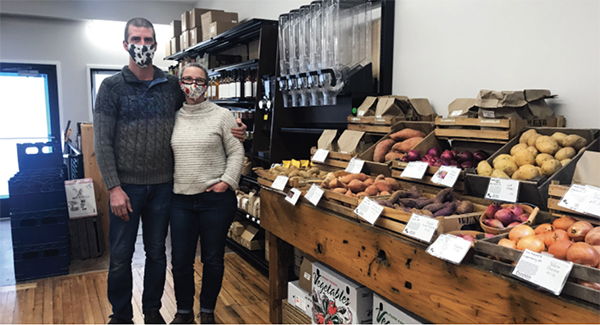
Dusty and Julia James of Radish & Rye Food Hub
Andrea Karns is used to working from her office, handling sales and overseeing the nine Karns Foods stores located in central Pennsylvania.
She’s been in the family business since she was 15. But as vice president of sales and marketing, she hadn’t worked inside one of the grocery stores for some time.
That changed in March when she found herself driving a delivery truck and pitching in as a cashier.
These were the early days of the COVID-19 pandemic—the days when Karns saw empty shelves and shortages, when people were stockpiling toilet paper, meat, canned goods, whatever.
“There was so much concern and question,” she said. “The unknown really fueled that panic buying.”
While customers have gone about their shopping during the pandemic—online or in person—local grocers have had to cook up new ways to keep up with the pandemic’s twist and turns. Larger grocery store chains may have experienced similar challenges, but with fewer resources, small stores in central Pennsylvania were in a unique predicament.
This is a lesson that owners Julia and Dusty James of Radish & Rye Food Hub know well.
“We’ve had to release expectations about what’s going to happen and do the best at any given time,” Julia James said.
Unlike Karns, Radish & Rye only had one location when the pandemic hit—their stand in the Broad Street Market in Harrisburg. But just like Karns, James painted a picture of an overwhelming flood of business in the early days of the pandemic.
Pre-COVID, that would have been any business owner’s dream, but, now, more people meant more confusion and more risk.
Radish & Rye quickly pivoted, closing their market stand to shoppers and operating as an online store exclusively.
“This was not something we ever thought would be part of our business model,” James said.
They also accelerated an existing plan to move into a storefront across from the market on N. 3rd Street.
James is glad that they were able quickly to build an alternative business model, but she misses the in-person experience of customers perusing the aisles. The scroll, click, add to cart of online grocery shopping is impersonal, detached. Soon, she expects to have a hybrid model as Radish & Rye opens their new brick and mortar to customers, while retaining the hard-won virtual store.
Just like Radish & Rye, Karns decided to provide online shopping for their customers, a plan that was always in the works, but was accelerated by the pandemic.
“We had to readjust and say, sometimes you have to make a different game plan,” Karns said.
Saving Grace
Although many small grocery stores had to rush to launch an online platform for customers, some, like The Healthy Grocer, a natural and organic market in Camp Hill, were already set.
“We were fully prepared,” said Susan Kiskis, general manager. “A lot of other health food stores were scrambling.”
While The Healthy Grocer could easily provide a safe way for customers to shop, they struggled to keep their supply up with the demand.
Kiskis explained that, at the beginning of the pandemic, people were over-buying, which stretched thin a national supply chain that wasn’t prepared. In addition, there were shortages in products from overseas due to closed ports and transportation issues. Meat was also in shorter supply from a lack of workers.
“We saw this chain link effect, and we felt it,” she said.
About half of The Healthy Grocer’s suppliers are local, small businesses, which Kiskis said was their “saving grace.” It’s often not easy to find all-natural, antibiotic and growth hormone-free products, but local places like the Carlisle Farmers Market, Dickinson College’s Organic Farm and COB Vegan Bakery in York came through for them.
However, nearing 10 months since the beginning of the pandemic, Kiskis still sees issues with the supply chain. Karns sees it too.
“You’ll still see empty spots on the shelf,” Karns explained. “We might not have your favorite, two-ply aloe vera toilet paper, but we have options.”
Karns stores may not be able to get products from every manufacturer, but they will most likely have the product you need, just maybe not your preferred brand.
“As a community, we’ve had to recognize we have been so fortunate that when we want something, we’ve been able to get it,” Karns said. “Now, having one brand is more important than three.”
Both Karns and Kiskis hope customers will understand that most of the time when they don’t have an item, it is out of their control.
As people have become more comfortable with navigating the COVID crisis, all three grocers have seen less traffic—and less chaos—over time.
Karns believes that shoppers are doing more in one trip and visiting the store less frequently. Additionally, Kiskis thinks that people are being more price-conscious, opting for bulk purchasing at larger chain stores.
Still, all three women were thankful for their loyal customers and staff members who have provided a bright spot during uncertain times.
“What stood out to me is how wonderful people have been,” James said. “People have been so sweet and kind.”
Karns is based in Mechanicsburg, with locations throughout central Pennsylvania. For more information and a list of locations, visit www.karnsfoods.com.
Radish & Rye Food Hub is located at 1308 N. 3rd St., Harrisburg. For more information or to shop online, visit www.radishandryehbg.com.
The Healthy Grocer is located at 3800 Trindle Rd., Camp Hill. For more information or to shop online, visit www.thehealthygrocer.com.
Support quality local journalism. Become a Friend of TheBurg!





